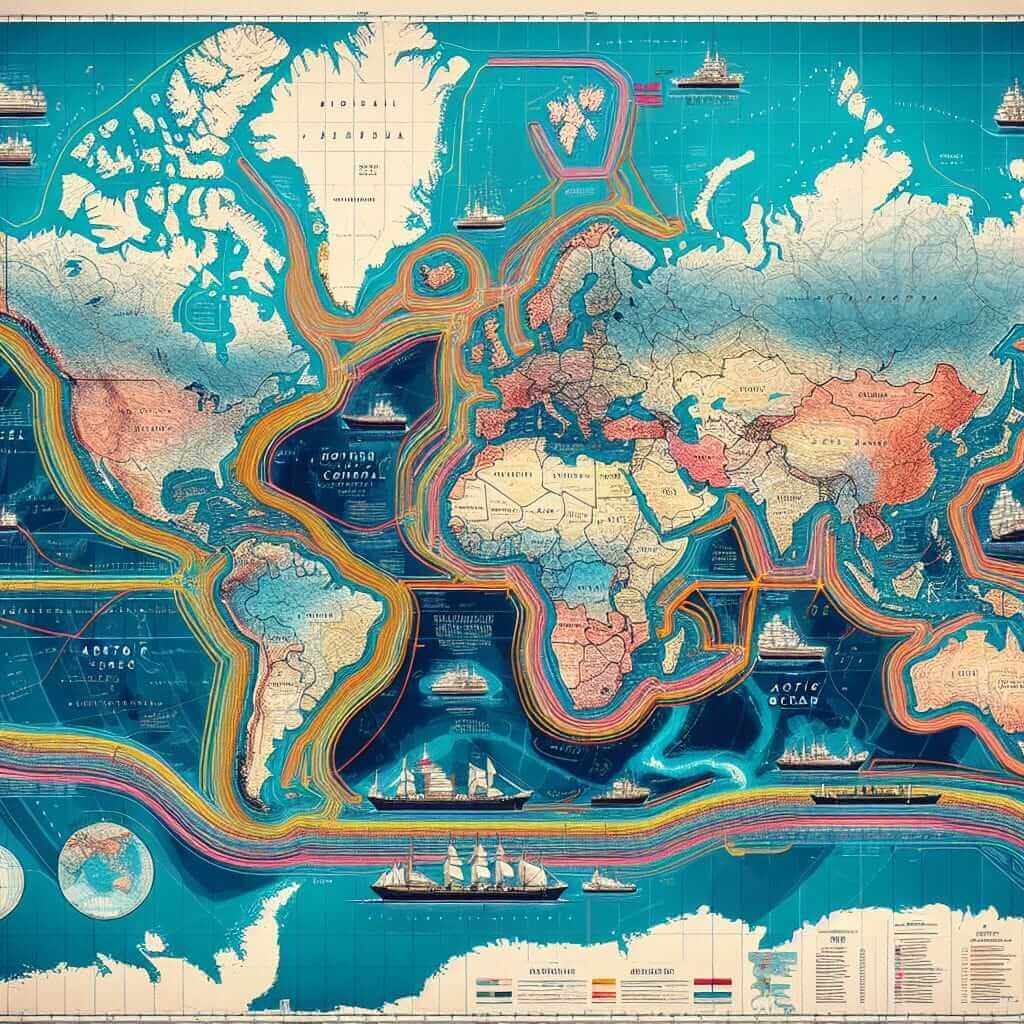The IELTS Reading section tests your ability to comprehend and analyze texts of varying complexity. Topics frequently include current global issues, making “How does climate change impact global trade routes?” a potential subject. This topic encompasses significant global shifts and the ramifications on international commerce, and its relevance ensures it could appear in future tests.
Practice Reading Test: Climate Change and Global Trade Routes
Passage: Medium Text
Climate change is reshaping the world in numerous ways, including global trade routes. Traditionally established routes are becoming increasingly unreliable, forcing the maritime industry to adapt swiftly. Changing sea levels, melting ice caps, and more frequent extreme weather events disrupt the predictability of shipping lanes and port operations.
One significant example is the Arctic region. As global temperatures rise, Arctic ice is melting at unprecedented rates, opening new northern shipping passages during the summer months. The Northern Sea Route, which traverses the Arctic along Russia’s coast, is one such newly accessible route. This passage significantly shortens the travel distance between Europe and Asia compared to the traditional Suez Canal route. However, navigating the Arctic presents unique challenges, such as unpredictable ice movement and a lack of infrastructure.

Moreover, climate change impacts not only the creation of new routes but also the stability of established ones. Rising sea levels threaten low-lying port cities worldwide. Ports in cities like Rotterdam and New Orleans must invest heavily in infrastructure changes to remain operational. Furthermore, extreme weather events, like hurricanes and typhoons, can cause sudden and severe disruptions in shipping schedules, leading to economic losses.
In addition to physical changes in trade routes, climate change also affects the types of goods being transported. There is an increasing demand for raw materials and technologies that combat climate change, such as solar panels and wind turbines. Conversely, industries reliant on stable climate conditions, like agriculture, may face declines, impacting global trade dynamics.
Questions
Multiple Choice
-
The passage mainly discusses:
A. The economic benefits of the Northern Sea Route.
B. How climate change affects global trade routes.
C. The decline in the agriculture industry.
D. Technological advancements in shipping. -
Why is the Northern Sea Route significant?
A. It eliminates the need for the Suez Canal.
B. It allows year-round shipping.
C. It offers a shorter distance between Europe and Asia.
D. It has well-established infrastructure.
True/False/Not Given
- Shipping schedules are increasingly unreliable due to climate change.
- Port cities are unaffected by rising sea levels.
- There is no demand for goods that address climate change.
Answer Key and Explanations
Multiple Choice
-
B. How climate change affects global trade routes.
Explanation: The passage comprehensively discusses multiple aspects of how climate change influences global trade routes, including the Northern Sea Route and impacts on port cities. -
C. It offers a shorter distance between Europe and Asia.
Explanation: The passage mentions that the Northern Sea Route shortens the travel distance between Europe and Asia compared to traditional routes like the Suez Canal.
True/False/Not Given
-
True.
Explanation: The passage states that extreme weather events cause unpredictability in shipping schedules, leading to disruptions. -
False.
Explanation: The text explicitly mentions that rising sea levels threaten low-lying port cities, necessitating substantial infrastructure investments. -
False.
Explanation: There is mention of the growing demand for goods like solar panels and wind turbines that combat climate change, indicating an increased demand for such commodities.
Common Mistakes to Avoid
- Overlooking Key Details: Ensure you identify and understand the context provided for each mentioned route and its implications.
- Misinterpreting Facts: Pay attention to qualifiers like “significant” and “unprecedented,” which depict the scale of changes described.
- Ignoring Contradictions: Distinguish between statements of fact and those of prediction or uncertainty, especially in passages involving future implications.
Vocabulary
- Unprecedented (adj): /ʌnˈpresɪdentɪd/ – never having happened before
- Infrastructure (n): /ˈɪnfrəstrʌktʃər/ – the basic physical and organizational structures needed for the operation of a society or enterprise
- Disrupt (v): /dɪsˈrʌpt/ – to cause disorder or turmoil in
- Ramifications (n): /ˌræmɪfɪˈkeɪʃənz/ – consequences of an action or event, especially when complex or unwelcome
Grammar Insight
Complex Sentences with Subordinating Conjunctions:
- Structure: Main clause + subordinating conjunction + subordinate clause
- Example: Shipping schedules are disrupted because extreme weather events are more frequent.
Tips for High IELTS Reading Scores
- Practise Regularly: Consistent practice with varied topics will enhance your reading and comprehension skills.
- Focus on Vocabulary: Learning and understanding high-level vocabulary is crucial.
- Understand Question Types: Familiarize yourself with different types of questions to improve your answering speed and accuracy.